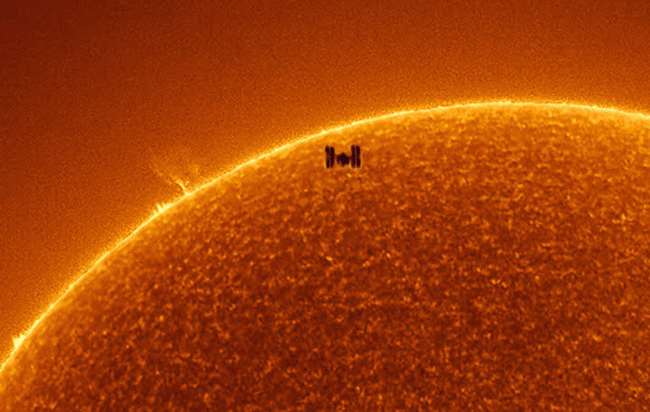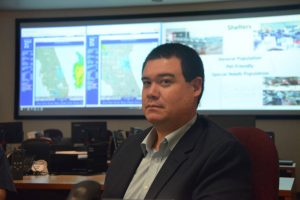
The National Weather Service has been issuing heat advisories day after day, and today cautioned of a heat index reaching to between 108 and 112 in this region. The forecast for today was for a heat index of 110, subsequently revised to 108. The heat index for Thursday is expected to reach 105.
“Unless you need to be outdoors stay indoors in the air conditioning,” says Jonathan Lord, Flagler County’s emergency management chief, “and for people to stay hydrated are the two most important things, because by the time you realize you’re thirsty may be too late for people impacted by the heat.”
The heat index measures how the human body feels from the combined effects of heat and humidity. “At the end of the day that heat index is a more important number to pay attention to, because even though it may only be 94 tomorrow,” Lord said, “it’s more important to focus on it feeling like it’s 110 and your body is going to react like it feels exposed to 110 degree weather.”
As of noon Wednesday in Palm Coast, for instance, the temperature read 88 Fahrenheit, but the heat index was at 100. Dehydration and exposure to heat may lead to heat exhaustion or worse, and is especially dangerous for very young children and older people, whose tolerance for extreme temperatures is lower.
With such persistent heat and more in the forecast, the Flagler County school district today announced a change in policy regarding air conditioning on most of its nearly 100 school buses. About 10 to 15 buses have no air conditioning, and are still running, which has angered many parents with children on those buses. ‘I can’t believe that my poor grandson just got off his bus so sick from the heat,” one Flagler resident wrote on a closed Facebook group Tuesday afternoon. “There was no air conditioning on the bus, no windows were open for any breeze at all. If you leave a child in a hot car with the windows closed you would be arrested for child endangerment. But my grandson has to sit on a hot closed up bus for 45 minutes in this heat and it’s okay. This sounds like a crime to me.”
The district’s statement does not address such issues, though School Board member Andy Dance, who also chairs a transportation safety committee, responded, saying the district has 10 buses on order this year and 10 more expected next year, with 18 ordered in the last two years.
“If you have a child on a bus that is not air-conditioned and they are not allowed to lower their windows, please let me know the bus name and the school,” Dance told the group, including his email ([email protected]). The district’s relaxing of the air conditioning rules appears to be at the instigation of Dance.

The advisory continues: “As you all are aware, we have been in an extreme heatwave these last few days. If the air conditioning system is running on a bus, the windows on that bus must remain up. The AC on our buses cannot begin to cool down the air if the windows are open. For the ten to fifteen buses we use on regular routes which do not have air conditioning, the windows of those buses will always be lowered, weather permitting.”
While eating and drinking on buses is prohibited, the district is also changing that policy to allow for drinking of water on the bus. “Should any student pour or throw water on other students, they may be subject to disciplinary actions,” the district warns.
The district’s policy change will remain in effect until the end of September.
Lord said the current heat, without much rain, is expected until the weekend. He urges residents to keep an eye on the weather, know their limits when they’re outside and heed any warning signs of heat stress.
See the latest weather briefing from the National Weather Service in Jacksonville below.
![]()
Click to access nws-jax-briefing-9.pdf






























Concerned Citizen says
As an amateur radio operator and astronomer the sun cycle certainly has an effect on our weather. Sunspots affect a lot of things including radio propagation. Right now we are on a low cycle of sunspot activity this affects the Higher Frequenct (HF) bands in a negative way.
Space weather can also affect communications in a broader sense. Coronal Mass Ejections can affect GPS users and satellites. Increased solar activity can produce radion risks to our Astronauts in space.
Weather just isn’t limited to planet earth. It’s fascinating to see space weather in action.
And we all know that Florida is 20 times closer to the Sun. ;)